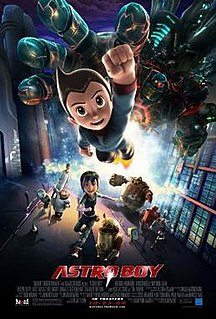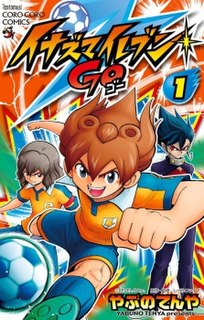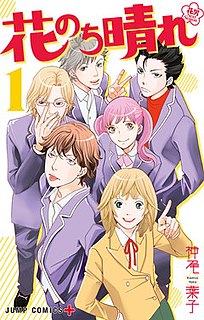
Astro Boy, known in Japan by its original name Mighty Atom, is a Japanese manga series written and illustrated by Osamu Tezuka. It was serialized in Kobunsha's Shōnen from 1952 to 1968. The 112 chapters were collected into 23 tankōbon volumes by Akita Shoten. Dark Horse Comics published an English translation in 2002. The story follows Astro Boy, an android young boy with human emotions who is created by Umataro Tenma after the recent death of his son Tobio. Eventually, Astro is sold to a robot circus run by Hamegg, but is saved from his servitude by Professor Ochanomizu. Astro becomes a surrogate son to Ochanomizu who creates a robotic family for Astro and helps him to live a normal life like an average human boy, while accompanying him on adventures.

Monster is a Japanese manga series written and illustrated by Naoki Urasawa. It was published by Shogakukan in their Big Comic Original magazine between 1994 and 2001, with the chapters collected in eighteen tankōbon volumes. The story revolves around Kenzo Tenma, a Japanese surgeon living in Düsseldorf, Germany whose life enters turmoil after getting himself involved with Johan Liebert, one of his former patients, who is revealed to be a dangerous serial killer.

Yu-Gi-Oh! R is a Japanese manga series written by Akira Itō, based on Kazuki Takahashi's Yu-Gi-Oh! manga. The series, which is a spin-off side story to the original manga, was serialized in Shueisha's V Jump magazine between April 2004 and December 2007, and was published in North America by Viz Media.

Astro Boy, known in Japan as Atom, is a fictional superhero and the protagonist of the eponymous franchise. Created by Osamu Tezuka, the character was introduced in the 1951 Captain Atom manga. Astro Boy has appeared in animated television shows and feature film adaptations of its eponymous manga, as well as a live-action TV series, other works by Tezuka, and video games.

Astro Boy, sometimes referred to as New Mighty Atom, is a color remake of the 1960s anime black-and-white series of the same name(s); both series are adapted from the manga series by Osamu Tezuka.

Astro Boy is a remake of the 1960s anime series of the same name created by Osamu Tezuka. Produced by Tezuka Productions, Sony Pictures Entertainment Japan, Animax, Dentsu, and Fuji TV, it was directed by Kazuya Konaka, with Marc Handler and Joe D'Ambrosia handling series scripts, Shinji Seya designing the characters, Shinji Aramaki and Takeshi Takakura designing the mechanical elements, Keiichirō Mochizuki serving as chief animation director, and Takashi Yoshimatsu composing the music. The anime was created to celebrate the birthdate of Atom/Astro Boy, as well as the 40th anniversary of the original TV series. It kept the same classic art style as the original manga and anime, but was renewed and modernized with more lush, high-quality, near-theatrical animation and visuals, combining the playfulness of the early anime with the darker, more serious and dramatic science fiction themes of the manga and the 1980 series. The anime was broadcast in Japan on Fuji TV from April 6, 2003, to March 28, 2004, every Sunday from 9:30 to 10:00 JST, for a total of 50 episodes, and it was also aired outside of Japan on Kids' WB in the US and other local broadcasters overseas.

Tenma, known as ASTRO-B before launch, was a Japanese X-ray astronomy satellite, developed by the Institute of Space and Astronautical Science. It was launched on February 20, 1983 using a M-3S rocket on the M-3S-3 mission.

Astro Boy is a Japanese television series that premiered on Fuji TV on New Year's Day, 1963, and is the first popular animated Japanese television series that embodied the aesthetic that later became familiar worldwide as anime. It originated as a manga of the same name in 1952 by Osamu Tezuka, revered in Japan as the "God of Manga". It lasted for four seasons, with a total of 193 episodes, the final episode presented on a Saturday, New Year's Eve 1966.

Saint Seiya: The Lost Canvas – The Myth of Hades, also known as simply The Lost Canvas, is a Japanese manga series written and illustrated by Shiori Teshirogi. It is a spin-off based on the manga series Saint Seiya, which was created, written and illustrated by Japanese author Masami Kurumada. The Lost Canvas was published by Akita Shoten in the Weekly Shōnen Champion magazine since August 24, 2006, concluding after 223 chapters on April 6, 2011, with twenty-five tankōbon released. Originally envisioned as a comic book whose purpose was to work simultaneously with Kurumada's Saint Seiya: Next Dimension as a multi-angle interpretation of the shared elements of its storyline, which stems from an event mentioned in Kurumada's original Saint Seiya manga; the approach was quickly abandoned, as both works greatly diverged, Kurumada's Next Dimension stayed as the canonical telling of these events, and The Lost Canvas as a separate alternate retelling. The story takes place in the 18th century, and focuses on how an orphan known as Tenma becomes one of Athena's 88 warriors known as Saints and finds himself in a war fighting against his best friend Alone who is revealed to be the reincarnation of Athena's biggest enemy, the God Hades.

Astro Boy is a 2009 computer-animated superhero film loosely based on the manga series of the same name by the Japanese writer and illustrator Osamu Tezuka. Produced by the Hong Kong-based company Imagi Animation Studios, it was directed by David Bowers, who co-wrote the screenplay with Timothy Hyde Harris. The film stars Freddie Highmore, Kristen Bell, Nicolas Cage, Bill Nighy, Matt Lucas, Eugene Levy, Nathan Lane, Samuel L. Jackson, Charlize Theron, and Donald Sutherland.

Inazuma Eleven GO is a role-playing video game and sports video game for the Nintendo 3DS developed and published by Level-5. It was released on December 15, 2011 in Japan and Europe on June 13, 2014 and released on July 18, 2015 in Australia and New Zealand. There are two versions of the game, Shine and Dark, which was released in Europe as Light and Shadow. An Inazuma Eleven GO anime and manga based on the game began serialization in CoroCoro Comic, while an anime based on the game produced by OLM started airing on May 14, 2011.

Inazuma Eleven GO is a Japanese manga series written and illustrated by Tenya Yabuno. It is based on the Level-5 video game series of the same title. The manga has been published by Shogakukan in CoroCoro Comic.

Inazuma Eleven GO: Kyūkyoku no Kizuna Griffon is a 2011 anime film. It is the 2nd film based on the popular manga and anime series Inazuma Eleven series. The film premiered on December 23, 2011 in Japan. The movie was shown in both traditional 2D and stereoscopic 3D.

Inazuma Eleven GO 2: Chrono Stone, or Inazuma Eleven GO Chrono Stones in Europe, is a role-playing video game and sports video game for the Nintendo 3DS developed and published by Level-5. It was released on December 13, 2012 in Japan and in Europe on March 27, 2015. There are two versions of the game, Neppuu, Wildfire in Europe, and Raimei ("Thunderclap"), Thunderflash in Europe. An Inazuma Eleven GO anime and manga based on the game began serialization in CoroCoro Comic, while an anime based on the game produced by OLM started airing on April 18, 2012. The story follows star Matsukaze Tenma his team, Raimon, and mysterious friendly allies who have come from the future, as they use a time machine to journey across history and attempt to prevent mysterious organisation from the future's plans to erase soccer from history.

Boys Over Flowers Season 2, known in Japan as Hana Nochi Hare: HanaDan Next Season, is a Japanese shōnen manga series written and illustrated by Yoko Kamio. It is a sequel to Kamio's Boys Over Flowers (1992–2003), which is the best-selling shōjo manga series of all time. The story takes place at Eitoku Academy, two years after the members of the F4 have graduated, with all new characters.

Inazuma Eleven GO: Chrono Stone is a Japanese manga series written and illustrated by Tenya Yabuno. It is based on the Level-5 video game series of the same title. The manga has been published by Shogakukan in CoroCoro Comic.

Inazuma Eleven GO: Galaxy is a role-playing video game and sports video game for the Nintendo 3DS developed and published by Level-5. It was released in Japan on December 5, 2013. No confirmation of a worldwide release has been given. There are two versions of the game, Big Bang and Supernova. An Inazuma Eleven Go Galaxy anime based on the game produced by OLM was aired from May 2013 to March 2014.
















